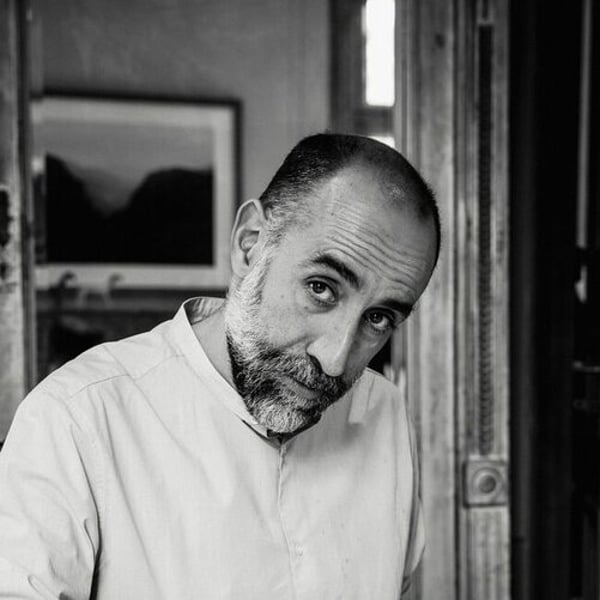To celebrate twenty-five years in business, Rabih Kayrouz is opening a temporary boutique in Paris from March 4 to May 30, at 16, rue Saint-Roch, in the 1st arrondissement. FashionNetwork.com looks back on his career and brand. The Lebanese couturier, who still holds a majority stake in his company, opened its capital in 2016 to the Azur Fund investment fund, which was joined in 2017 by Lebanese financier Fawzi Kyriakos-Saad. He tells FashionNetwork.com how he has strengthened his “human-scale” strategy by focusing more on direct sales. Going against the grain more than ever of the big names in luxury, focusing on very high-quality clothing, he advocates above all “respect for what surrounds us”.
FashionNetwork: Where does Maison Rabih Kayrouz stand today?
Rabih Kayrouz: After suffering a lot in 2020, the company is now back in good health. We don’t divulge our sales figures. But the London boutique, which we opened at the beginning of 2020, saw its sales increase by 30% last year. We have put in place a new strategy to get closer to customers, just as I did when I started out twenty-five years ago in Beirut, and then by launching ready-to-wear fifteen years ago in Paris.
FNW: What have you changed in your approach?
RK: For some years now, I’ve been wondering about the traditional model based on the multi-brand distribution network. I no longer believe in it. Then, in 2020, there was Covid and the explosion in Beirut, where I almost died. That made me rethink my business. I wanted to change and concentrate more on direct sales. Before Covid, we had 55 multi-brand retailers, mainly in Europe, the United States, the Middle East and a few in Asia, between Japan and Hong Kong. Since then, we’ve decided to drastically reduce the number.
FNW: What is your multi-brand network like now?
RK: We’ve maintained just fifteen or so dealers, keeping the most important partners. Those with whom we’ve built up a close relationship and whom I see, in fact, as extensions of my own shops. In London, there’s Dover Street Market. Then we have some very fine boutiques in the United States, such as Ikram in Chicago, Forty Five Ten in Dallas, Boyds in Philadelphia, etc., as well as in France with, among others, Pearl in Marseille, Le Shop 17 in Cannes and Maison Orso in Rennes.
FNW: So you’re banking on a retail strategy?
RK: We’re staying on a very human scale. We want to put more emphasis on retail. In our shops, we can better express the universe of the brand. We can count on our three shops in London, Beirut and Paris, where at the beginning of March we will open our first pop-up shop, on rue Saint-Roch. We’d like to transform this pop-up into a permanent shop on this street, or elsewhere.
FNW: What are your main markets?
RK: The United States and France. London is also an important market, as is Beirut. We lost everything there in 2020, but not the team, which is fantastic. They are the ones who have kept the company in place, where we have reopened a space in an old Lebanese house with the workshop and studio on the ground floor and the boutique and fitting room on the first floor.
FNW: How is your offer structured?
RK: We focus on clothing with a ready-to-wear line, a bridal line, couture orders with exceptional dresses and craftsmanship and special orders. In some ready-to-wear models, which we call the essentials or the iconics because they exist all the time, the customer can choose her materials and colours. And then, from time to time, we also have a range of jewellery-sculptures made in-house.
When a garment lasts, it’s priceless.
FNW: Who are you targeting?
RK: A rather liberated woman, whether she’s 16 or 60.
FNW: How is production organised?
RK: The collection is developed in Paris, 80% of the ready-to-wear is made in France in workshops in the Paris suburbs and in the provinces, and 20% in Europe, in Italy, Bulgaria, Spain and Portugal. The fabrics are European, Italian and English, and for technical fabrics I turn to a leading specialist in Japan. In Beirut, the business is focused on local customers.
FNW: How do you see fashion today?
RK: I like fashion less and less. What I like is clothes. You have to stick to what you love, what you know how to do, and do it perfectly well, keeping the quality of the fabric and the workmanship, which tend to get lost. When a garment lasts, it’s priceless. In that sense, quality is cheap. When we work in a decent and respectful way, on all levels – social, political, environmental and planetary – respecting what surrounds us is what being modern is all about!
FNW: Do you see consumers changing in this direction?
RK: Instead of buying a lot and buying badly, people prefer to buy little and buy well. More and more young people are thinking along these lines. They’ve already worn less quality and they can see the difference. They prefer luxury more and more. The prices are not exorbitant, with day dresses at €1,000, coats and jackets around €2,000, and evening dresses from €3,500.
FNW: Why are you no longer exhibiting at Couture Week?
RK: My brand is more and more established, and I prefer to communicate in other ways. Not taking part is also a reaction to what’s happening in the world. And fashion shows have become spectacles, which doesn’t correspond to my approach.
Copyright © 2024 FashionNetwork.com All rights reserved.







